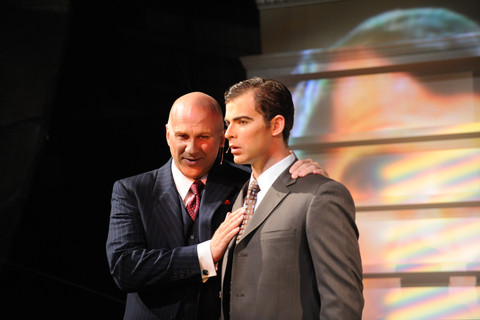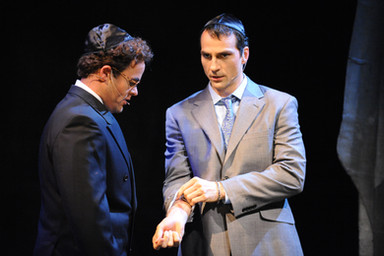FWO Archives: Peter Eötvös and Tony Kushner's 'Angels in America' (2008 Festival)
- Fort Worth Opera
- Jun 16, 2020
- 6 min read
MATTHEW ERIKSON'S PROGRAM NOTES

ADAPTIVE ‘ANGELS’
It includes meditations on politics, American history, love and mortality. It has plenty of religion-Jewish and Christian imagery, angels and a trip to Heaven and back. It's a healing tale of reconciliation and hope, on how to find reasons for living during a time of suffering, loss and confusion.

It would be inane to call Tony Kushner's Pulitzer Prize-winning Angels in America an "AIDS play." That would be like describing Casablanca as a World War II film or Death of a Salesman as a domestic drama. The richness, intricately drawn characters and epic scale of Kushner's two-part magnum opus (what the author himself calls "a gay fantasia on national themes") are perhaps reasons why, unlike other period pieces of the 1980s and '90s relating to the AIDS epidemic, Angels in America continues to be regarded as one of the most important American stage works ever written.
Yet in spite of (or perhaps because of its) mild didacticism and surreal flights of imagination, it is hugely entertaining. In a further sign of its mainstream success, Angels in America has been adapted for television (the 2004 HBO special directed by Mike Nichols and starring Al Pacino and Meryl Streep) and, now, as an opera by Hungarian composer-conductor, Peter Eötvös. Fort Worth Opera's production of this musical version of Angels in America it premiered at Paris' Châtelet Theatre in 2004 - is only the second time that Eötvös' work has been performed in North America.

On one hand, the adaptation of Angels in America into an opera might seem a natural fit. Musical references abound in the play's stage directions. (For the 1993 Broadway premiere of Angels in America, award-winning jazz composer Anthony Davis wrote music.) Moreover, the play's larger-than-life characters almost shout for operatic treatment.

At the story's heart are two AIDS patients, the reluctant "prophet" Prior Walter and the real-life lawyer and '50s red-baiter Roy Cohn. These antithetical characters' social orbits intersect and clash, helping create much of the play's tension and comedy. The story's two dysfunctional couples - one gay and the other Mormon and nominally heterosexual - are complemented by other vivid personalities, portrayed by a small number of performers duplicating parts. The husband-wife team of Eötvös and librettist Mari Mezei keep that casting arrangement in their opera.
Read the PLAYBILL article by Adam Hetrick HERE.

But with Angels in America, the question of adaptation is very complicated. Adaptation is always fraught with challenges. Audiences often end up forming their strong preconceptions of what the remake should be like. (Just think of that movie based on your favorite book or that piano transcription based on a beloved symphonic work.) The question of authenticity or "faithfulness" inevitably comes up too. Does the adapted version set the right (meaning similar) tone? Does it in any way detract from the original? Too seldom is the new version judged on its own terms, with due consideration of the unique conventions, limitations and advantages of the chosen medium.


With Angels in America, there is the obvious issue of compression. Singing takes longer than speaking, so a libretto must contain far fewer words than a play. But how exactly do you rework an epic seven-hour play into a two-hour length opera? While retaining the two-part structure of Kushner's design (the two acts of the opera correspond with the original plays Millennium Approaches and Perestroika respectively), naturally some parts are left out in Eötvös and Mezei's version.
Still, there are many precedents of operas successfully adapting works that may have initially seemed too unwieldy or epic. Sergei Prokofiev tackled no other than Leo Tolstoy's 1000-plus page War and Peace later in his life. In the end, the creators came up with a loose series of tableaux as nearly effective as Tchaikovsky's Eugene Onegin or Mussorgsky's Boris Godunov.

In Eötvös’ Angels in America, atmospheric - almost hallucinogenic-washes of acoustic and electric sound combine with mostly declamatory vocal settings of Kushner's text. Much is different from the original. Although Angels in America is often regarded as an indictment of '80s Reaganism, the operatic version leaves out any spoken reference to our 40th president.
On the other hand, taking out the '80s references and politics universalizes the story. The hazy orchestral writing and speech-like vocal lines are the musical engines that propel the story forward. It's one of many artistic calls and compromises that audiences need to ultimately judge for themselves. That is, without taking too much of a literalist, reverential stance on Kushner's beloved original.
"Nothing's lost forever," concludes the pill-popping Harper at the end of the play. "In this world, there is a kind of painful progress. Longing for what we've left behind, and dreaming ahead." While many things were inevitably lost in translation as Angels in America made its way from play to opera, there are more than ample rewards to be gathered from what is gained. -Matthew Erikson
Matthew Erikson is the former classical music critic of the Fort Worth Star-Telegram and the Hartford Courant. He currently works as a freelance writer and musician.
Angels In America
Music by Peter Eötvös
Libretto by Mari Mezei
After the original theater play by Tony Kushner
Conductor Christopher Larkin
Director David Gately
Scenic and Video Designer Peter Nigrini
Costume Designer Claudia Stephens
Makeup and Wig Designer James P. McGough
Lighting Designer Nicholas Cavallero
Assistant Video Designer Andrew C. Bauer
Assistant Costume Designer Jennifer Ables
Stage Manager Elisa Castillo
Repetiteur Tyson Deaton
Vocal Coach Mary Dibbern
Featuring members of the Fort Worth Symphony Orchestra
The Cast in Order of Vocal Appearance
Rabbi Chemelwitz/Hannah Pitt/Henry/Angel Asiatica Janice Hall
Louis Ironson/Angel Oceania Scott Scully
Prior Walter David Adam Moore
Roy Cohn/Ghost 1/Angel Australia Kelly Anderson
Joseph Pitt/Ghost 2/Angel Europe Craig Verm
Harper Pitt/Ethel Rosenberg/Angel Antarctica Erin Elizabeth Smith
Mr. Lies/Homeless Person/Belize/Angel Africanii Daniel Billings
The Angel Ava Pine
Vocal Trio Meredith Browning
Alissa Anderson
Steven Mumbert
PETER EÖTVÖS, Composer
Composer, conductor and teacher. the Hungarian Peter Eötvös combines all three roles in one very high-profile career. His music features regularly in the programs of orchestras, contemporary music ensembles and festivals worldwide; and as composer/ conductor he has led projects focusing on his work in centers including Paris, London, Berlin, Vienna, Lucerne, Göteborg. His operas, Le Balcon and Angels in America, follow the lead of his Three Sisters by generating an ever-increasing number of new productions; and several major music theater commissions are due in the next few years by the Opéra National de Lyon, Glyndebourne Festival Opera and the Bayerische Staatsoper.

Peter Eötvös’ conducting activities are characterised especially by long-term relationships with a number of key orchestras and institutions: the Berlin Philharmonic, Munich Philharmonic, Orchestre Philharmonique de Radio France, Ensemble lntercontemporain and Netherlands Radio. Since 2003, Peter Eötvös holds title as Principle Guest Conductor of the Gothenburg Symphony Orchestra. He will start as Principle Guest Conductor of the Vienna Radio Symphony Orchestra in the 2009-2010 season.
Mr. Eötvös is generally regarded as one of the leading interpreters of contemporary music. He performed regularly with the Stockhausen Ensemble between 1968 and 1976 and collaborated with the electronic music studio of the Westdeutscher Rundfunk in Cologne from 1971 to 1979. In 1978, at the invitation of Pierre Boulez, he conducted the inaugural concert of IRCAM in Paris, and was subsequently named Musical Director of the Ensemble lnterContemporain, a post he held until 1991.
His teaching activities are of equal importance to him as his composition and performance career - especially his work at the Musikhochschule in Karlsruhe since 1992 and at the International Eötvös Institute and Foundation for young conductors and composers in Budapest, which he founded in 1991.
Mr. Eötvös has been honored with numerous awards including the Officier de l'Ordre des l'Arts et des Lettres and the Commandeur l'Ordre des Arts et des Lettres by the French Cultural Minister as well as the Kossuth Prize, the Bartók Prize, the Royal Philharmonic Society Music Award and the Prize SACO Palmarés "Prix Musique." He also received the Cannes Classical Award for "Living Composer," the Pro Europa Composition Prize and was nominated for a Grammy Award in 2004. Peter Eötvös is the winner of the 2007 Frankfurt Music Prize.
TONY KUSHNER, Playwright
Tony Kushner's plays include A Bright Room Called Day; Angels in America, Parts One and Two; Slavs!; and Homebody/ Kabul. Caroline, or Change, a musical with composer Jeanine Tesori, was produced in the autumn of 2006 at the Royal National Theatre in London, where it received the Evening Standard Award, the London Drama Critics’ Circle Award and the Olivier Award for Best Musical.
Mr. Kushner has adapted and translated Pierre Corneille's The Illusion, S.Y. Ansky's The Dybbuk, Bertolt Brecht's The Good Person of Sezuan and Mother Courage and Her Children; and the English-language libretto for the opera Brundibár by Hans Krasa. He wrote the screenplays for Mike Nichols' film of Angels in America, and Steven Spielberg's Munich.
His books include Brundibar; with illustrations by Maurice Sendak; The Art of Maurice Sendak, 1980 to the Present; and Wrestling with Zion: Progressive Jewish-American Responses to the Palestinian/Israeli Conflict, co-edited with Alisa Solomon. Mr. Kushner is the recipient of a Pulitzer Prize, two Tony Awards, three Obie Awards, an Emmy Award and an Oscar nomination, among other honors. He lives in Manhattan with his husband, Mark Harris.





































Comments